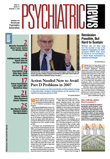He's “a chip off the old block,” the old expression goes. The aphorism could also apply to the children of women with eating disorders. By the age of 10 years, such youngsters are more likely to be concerned about their weight and shape and to diet than are youngsters whose mothers do not have such disorders, a new study has found.
The investigation was headed by Alan Stein, M.D., a child and adolescent psychiatrist at the University of Oxford in England. Results appeared in the October British Journal of Psychiatry.
Fifty-six one-year-olds were recruited for this longitudinal study. Thirty-three had mothers with eating disorders; the other 23 did not. The former served as index subjects, the latter as controls. At the age of 10 years, index subjects and control subjects were assessed for disturbed eating attitudes and habits. Results for both groups were compared.
The index group scored significantly higher than the control group on three types of eating disorder psychopathology—shape concern, weight concern, and dieting. However, none of the index subjects had a full-blown eating disorder, at least not yet.
Mealtime interactions between index subjects and their mothers were also videotaped when the subjects were 5 years of age. The investigators evaluated the videotapes to see whether any mother-child pairs engaged in mealtime conflicts—that is, where mealtime was a battle for control between mother and child, with the mother insisting on the manner and amount of food eaten. The researchers then determined whether there was a significant association between index subjects' mealtime conflicts at age 5 and their eating psychopathology at age 10. There was, they found.
Finally, the mothers of index subjects were evaluated for eating disorders when the subjects were 5 and 10 years of age. The researchers looked to see whether there was a link between the subjects' eating psychopathology at 10 years and how long they had been exposed to a maternal eating disorder. The answer was yes, and the association was highly significant statistically.
Thus, the children of mothers with eating disorders may be at heightened risk of such illnesses themselves, the investigators concluded. However, only a longer followup of such subjects will reveal whether this is truly the case, they admit.
And even if it turns out that youngsters of mothers with eating disorders are imperiled by the same illnesses, it still remains to be determined how much such danger comes from exposure and how much from genes since eating disorders appear to have a genetic input (Psychiatric News, September 2, 2005). However, their findings certainly suggest that exposure is at least partially responsible, the investigators pointed out in their study report.
“Further research,” Stein and his team concluded, “is [also] required to establish whether identifying and treating mothers with eating disorders... reduces the risk of children developing disturbances in their own eating habits and attitudes.”
The study was funded by the Wellcome Trust and the Tedworth Charitable Trust.
